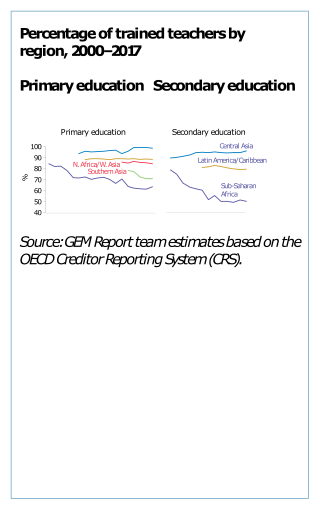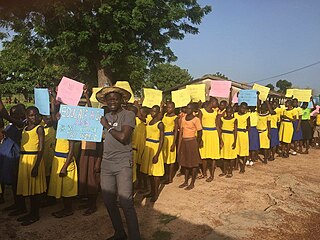
Peer review is the evaluation of work by one or more people with similar competencies as the producers of the work. It functions as a form of self-regulation by qualified members of a profession within the relevant field. Peer review methods are used to maintain quality standards, improve performance, and provide credibility. In academia, scholarly peer review is often used to determine an academic paper's suitability for publication. Peer review can be categorized by the type of activity and by the field or profession in which the activity occurs, e.g., medical peer review. It can also be used as a teaching tool to help students improve writing assignments.
A teaching method is a set of principles and methods used by teachers to enable student learning. These strategies are determined partly by the subject matter to be taught, partly by the relative expertise of the learners, and partly by constraints caused by the learning environment. For a particular teaching method to be appropriate and efficient it has to take into account the learner, the nature of the subject matter, and the type of learning it is supposed to bring about.

A teacher, also called a schoolteacher or formally an educator, is a person who helps students to acquire knowledge, competence, or virtue, via the practice of teaching.

English as a second or foreign language refers to the use of English by individuals whose native language is different, commonly among students learning to speak and write English. Variably known as English as a foreign language (EFL), English as a second language (ESL), English for speakers of other languages (ESOL), English as an additional language (EAL), or English as a new language (ENL), these terms denote the study of English in environments where it is not the dominant language. Programs such as ESL are designed as academic courses to instruct non-native speakers in English proficiency, encompassing both learning in English-speaking nations and abroad.
Blended learning or hybrid learning, also known as technology-mediated instruction, web-enhanced instruction, or mixed-mode instruction, is an approach to education that combines online educational materials and opportunities for interaction online with physical place-based classroom methods.
BrainPop is a group of educational websites based in New York City. It hosts over 1,000 short animated movies for students in grades K–8, together with quizzes and related materials, covering the subjects of science, social studies, English, math, engineering and technology, health, arts and music. In 2022, Kirkbi A/S, the private investment and holding company that owns a controlling stake in Lego, acquired BrainPop.
Educational technology is the combined use of computer hardware, software, and educational theory and practice to facilitate learning. When referred to with its abbreviation, "EdTech", it often refers to the industry of companies that create educational technology. In EdTech Inc.: Selling, Automating and Globalizing Higher Education in the Digital Age, Tanner Mirrlees and Shahid Alvi (2019) argue "EdTech is no exception to industry ownership and market rules" and "define the EdTech industries as all the privately owned companies currently involved in the financing, production and distribution of commercial hardware, software, cultural goods, services and platforms for the educational market with the goal of turning a profit. Many of these companies are US-based and rapidly expanding into educational markets across North America, and increasingly growing all over the world."

Classroom management is the process teachers use to ensure that classroom lessons run smoothly without disruptive behavior from students compromising the delivery of instruction. It includes the prevention of disruptive behavior preemptively, as well as effectively responding to it after it happens. Such disruptions may range from normal peer conflict to more severe disturbances of the social class dynamics, such as bullying among students, which make it impossible for the affected students to concentrate on their schoolwork and result in a significant deterioration of their school performance.

Audiovisual education or multimedia-based education (MBE) is an instruction method where particular attention is paid to the audiovisual or multimedia presentation of the material to improve comprehension and retention.

Teacher education or teacher training refers to programs, policies, procedures, and provision designed to equip (prospective) teachers with the knowledge, attitudes, behaviors, approaches, methodologies and skills they require to perform their tasks effectively in the classroom, school, and wider community. The professionals who engage in training the prospective teachers are called teacher educators.

Inclusion in education refers to including all students to equal access to equal opportunities of education and learning, and is distinct from educational equality or educational equity. It arose in the context of special education with an individualized education program or 504 plan, and is built on the notion that it is more effective for students with special needs to have the said mixed experience for them to be more successful in social interactions leading to further success in life. The philosophy behind the implementation of the inclusion model does not prioritize, but still provides for the utilization of special classrooms and special schools for the education of students with disabilities. Inclusive education models are brought into force by educational administrators with the intention of moving away from seclusion models of special education to the fullest extent practical, the idea being that it is to the social benefit of general education students and special education students alike, with the more able students serving as peer models and those less able serving as motivation for general education students to learn empathy.
An edublog is a blog created for educational purposes. Edublogs archive and support [[dibu] and teacher learning by facilitating reflection, questioning by self and others, collaboration and by providing contexts for engaging in higher-order thinking. Edublogs proliferated when blogging architecture became more simplified and teachers perceived the instructional potential of blogs as an online resource. The use of blogs has become popular in education institutions including public schools and colleges. Blogs can be useful tools for sharing information and tips among co-workers, providing information for students, or keeping in contact with parents. Common examples include blogs written by or for teachers, blogs maintained for the purpose of classroom instruction, or blogs written about educational policy. Educators who blog are sometimes called edubloggers.
The National Energy Education Development Project (NEED) is a non-profit education association that designs and delivers energy education programs. The NEED Project's educator network includes over 65,000 classrooms nationwide that use NEED's annually up-dated curriculum materials.

Differentiated instruction and assessment, also known as differentiated learning or, in education, simply, differentiation, is a framework or philosophy for effective teaching that involves providing all students within their diverse classroom community of learners a range of different avenues for understanding new information in terms of: acquiring content; processing, constructing, or making sense of ideas; and developing teaching materials and assessment measures so that all students within a classroom can learn effectively, regardless of differences in their ability. Differentiated instruction means using different tools, content, and due process in order to successfully reach all individuals. Differentiated instruction, according to Carol Ann Tomlinson, is the process of "ensuring that what a student learns, how he or she learns it, and how the student demonstrates what he or she has learned is a match for that student's readiness level, interests, and preferred mode of learning." According to Boelens et al. (2018), differentiation can be on two different levels: the administration level and the classroom level. The administration level takes the socioeconomic status and gender of students into consideration. At the classroom level, differentiation revolves around content, processing, product, and effects. On the content level, teachers adapt what they are teaching to meet the needs of students. This can mean making content more challenging or simplified for students based on their levels. The process of learning can be differentiated as well. Teachers may choose to teach individually at a time, assign problems to small groups, partners or the whole group depending on the needs of the students. By differentiating product, teachers decide how students will present what they have learned. This may take the form of videos, graphic organizers, photo presentations, writing, and oral presentations. All these take place in a safe classroom environment where students feel respected and valued—effects.

A flipped classroom is an instructional strategy and a type of blended learning. It aims to increase student engagement and learning by having pupils complete readings at home, and work on live problem-solving during class time. This pedagogical style moves activities, including those that may have traditionally been considered homework, into the classroom. With a flipped classroom, students watch online lectures, collaborate in online discussions, or carry out research at home, while actively engaging concepts in the classroom with a mentor's guidance.
Invitational education (IE) is an theory of educational practice that emphasizes the importance of internal knowledge in relation to external connections to the outside world and educational system. A key feature is that a student's positive self-concept, leading to their productivity, be developed through the school environment.

In the United States, elementary schools are the main point of delivery of primary education, for children between the ages of 4–11 and coming between pre-kindergarten and secondary education.
Educator effectiveness is a United States K-12 school system education policy initiative that measures the quality of an educator performance in terms of improving student learning. It describes a variety of methods, such as observations, student assessments, student work samples and examples of teacher work, that education leaders use to determine the effectiveness of a K-12 educator.
Co-teaching or team teaching is the division of labor between educators to plan, organize, instruct and make assessments on the same group of students, generally in the a common classroom, and often with a strong focus on those teaching as a team complementing one another's particular skills or other strengths. This approach can be seen in several ways. Teacher candidates who are learning to become teachers are asked to co-teach with experienced associate teachers, whereby the classroom responsibilities are shared, and the teacher candidate can learn from the associate teacher. Regular classroom teachers and special education teachers can be paired in co-teaching relationships to benefit inclusion of students with special needs.
Data-driven instruction is an educational approach that relies on information to inform teaching and learning. The idea refers to a method teachers use to improve instruction by looking at the information they have about their students. It takes place within the classroom, compared to data-driven decision making. Data-driven instruction works on two levels. One, it provides teachers the ability to be more responsive to students’ needs, and two, it allows students to be in charge of their own learning. Data-driven instruction can be understood through examination of its history, how it is used in the classroom, its attributes, and examples from teachers using this process.









